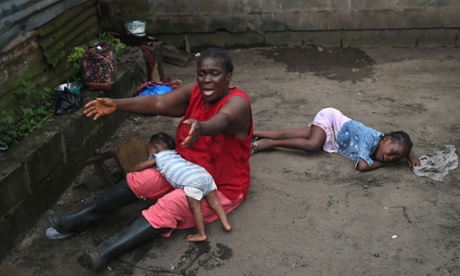International health organisations have criticised Australia’s ‘underwhelming’ response to the outbreak in west Africa

The Australian government will not send doctors or nurses to west Africa to help contain the Ebola crisis until it is certain “all of the risks are being properly managed”, the prime minister, Tony Abbott, has said.
Figures released on Saturday by the World Health Organisation show that more than 4,000 people have died in the Ebola epidemic that broke out in west Africa in March, out of a total of 8,399 registered cases. The death toll includes 233 health workers.
International health organisations such as Médecins sans Frontières (MSF) have criticised the Abbott government’s “underwhelming” response to the outbreak, which has included cash grants to MSF, the World Health Organisation and British front line efforts in Sierra Leone – but no Australian medical personnel.
Save the Children has called on the government to follow the lead of the Obama administration and send troops to help manage the response to the epidemic, which has claimed over 2,300 lives in Liberia alone.
But Abbott said on Sunday that the latest death toll would not change the government’s view on sending Australian health workers.
“We aren’t going to send Australian doctors and nurses into harm’s way without being absolutely confident that all of the risks are being properly managed. And at the moment we cannot be confident that that is the case,” the prime minister said.
Abbott said he “admired the selfless humanitarianism” of the dozens of Australian doctors and nurses currently working in west Africa with non-government organisations. But there was “a world of difference” between that and “ordering Australian personnel to go into a situation without the kind of risk minimisation strategies that any responsible Australian government would have to put it place”.
Containing the Ebola outbreak had been considered “on a number of occasions” by the cabinet national security committee and people arriving in Australia from west Africa were being “carefully screened … and that will continue”.
“But I do want to stress it would be irresponsible of the Australian government to order our personnel into harm’s way without all appropriate precautions being in place, and at this time, they simply aren’t and they can’t be,” he said.
An Australian nurse, Sue-Ellen Kovack, tested negative for the virus on Friday, after checking into a Cairns hospital with a low-grade fever following her return from a humanitarian mission to Sierra Leone.
Australian quarantine officers revealed on Thursday they have held six people suspected of having Ebola at airports, after interviewing 651 travellers in the past few months as part of efforts to keep the disease from spreading into the country.
